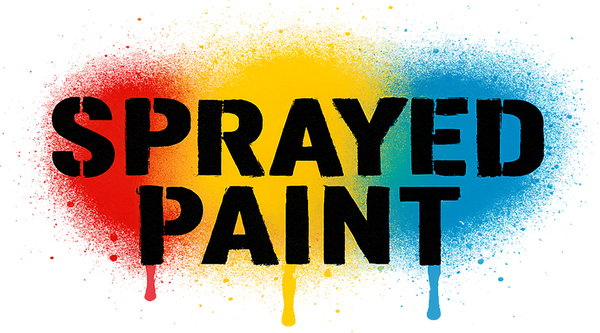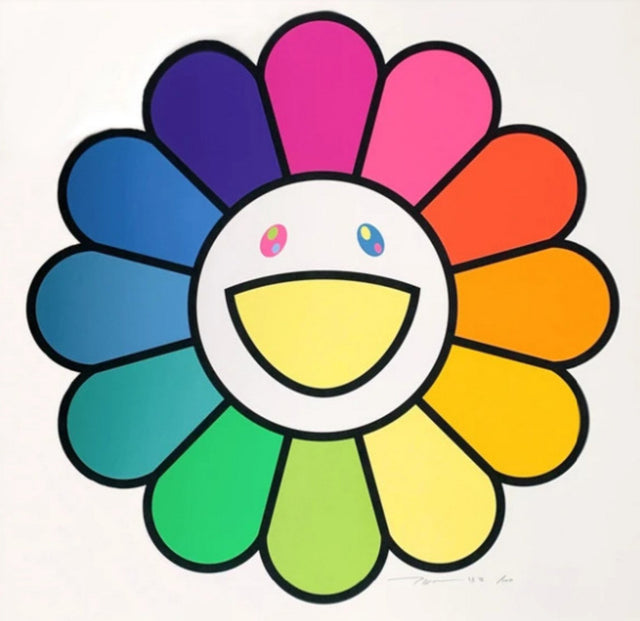
Takashi Murakami TM/KK
-
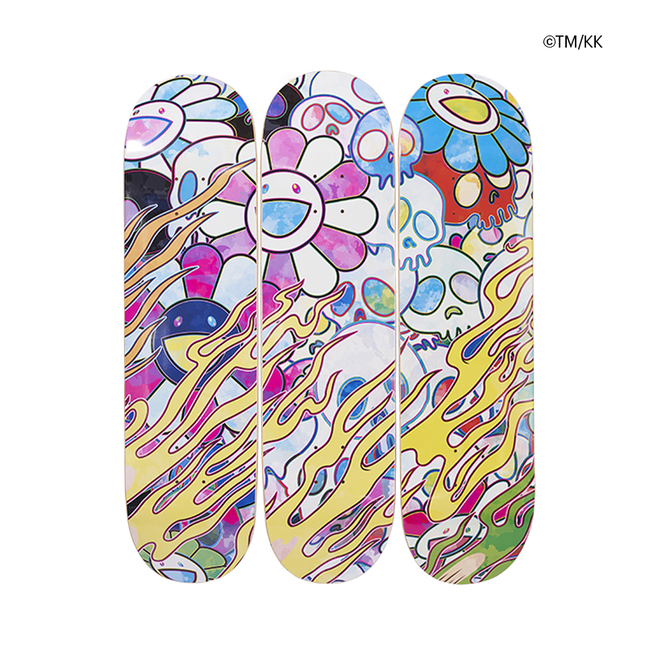
Takashi Murakami TM/KK Flaming Skull Skateboard Art Deck Set by Takashi Murakami TM/KK
Flaming Skull Skateboard Art Deck Set by Takashi Murakami TM/KK Limited Edition Archival Print on Wood Skateboard Deck by Street Artwork Graffiti Artist. 2018 Limited Edition Skateboard Artwork Size 8x31 Skateboard Art Deck Brand New Perfect Condition Flaming Skull Skateboard Art Deck Set by Takashi Murakami: Skate Culture Icons in Street Pop Art & Graffiti Artwork Flaming Skull Skateboard Art Deck Set by Takashi Murakami is a 2018 limited edition triptych consisting of three 8 x 31 inch wood skateboard decks printed with a vibrant archival design. Issued through TM/KK and presented in brand new condition, this piece transforms the visual motifs of Murakami’s Superflat style into a collectible surface rooted in both urban rebellion and fine art tradition. The work features his signature smiling flowers and neon skulls engulfed in candy-colored flames, creating a frenetic collision of joy, death, and energy. It exemplifies the aesthetic and cultural fusion at the heart of Street Pop Art & Graffiti Artwork. Murakami, born in Japan in 1962, is known globally for reimagining Japanese kawaii culture through contemporary art. In Flaming Skull, his recurring iconography is pushed to maximum saturation. The decks explode with pastel flames that dance between pinks, yellows, and blues, consuming and encircling the now-iconic wide-eyed flowers and stylized skulls. These elements are not randomly placed. The skulls nod to the transience of life while the grinning flowers, usually symbols of peace and cuteness, now float among the burning chaos. The contrast between innocence and destruction becomes a central visual tension. The skate decks act as both art objects and emblems of resistance, reinforcing how Murakami's work translates fluidly between gallery settings and street culture. Superflat Meets Skate: Murakami's Surfaces of Power The use of skateboard decks as a medium adds another dimension to Murakami’s Superflat philosophy, which compresses visual depth and collapses distinctions between high art and commercial design. In the Flaming Skull set, the decks function not only as a canvas but also as a cultural object—a symbol of countercultural identity, mobility, and rebellion. Skateboards have historically served as both mode of transport and personal billboard, making them ideal platforms for artwork that is as expressive as it is political. Murakami’s designs, printed seamlessly across the three decks, maintain a sense of cohesion while taking advantage of the vertical format and curvature unique to skateboards. His combination of illustrative clarity and chaotic form aligns with the structure of street graphics, often characterized by repetition, exaggeration, and intense color. Flaming Skull is not static. It evokes speed, spontaneity, and movement—qualities inherent to skateboarding and to graffiti. Symbolic Language and the Visual Noise of Urban Life This work amplifies Murakami’s ongoing exploration of symbolism, pop culture, and emotional intensity. The juxtaposition of flames and floral motifs mirrors how graffiti writers tag over advertisements, blending commercial and underground languages into something personal and uncontrollable. The skulls invoke cycles of life and death without morbidity, depicted in luminous tones that transform fear into fantasy. By placing these forms in riotous layers, Murakami crafts a surface that feels as alive as a street wall—an artwork where every inch pulses with energy and intention. Flaming Skull, like much of Murakami’s work, resists easy categorization. It channels anime aesthetics while referencing traditional Japanese painting. It uses joyful motifs in unsettling ways, exposing the volatility of contemporary life. The work's chaotic harmony is reflective of Street Pop Art & Graffiti Artwork, where cultural clutter becomes the material of revolution and emotional response. Takashi Murakami’s Street-Level Reach through Skateboard Art Murakami’s Flaming Skull Skateboard Art Deck Set encapsulates the global crossover between contemporary art and street expression. While he is firmly established within the art world, his use of materials like skateboards speaks to a different kind of power—one rooted in youth culture, physical movement, and accessible rebellion. These decks, though never meant to be ridden, carry the spirit of resistance and creativity that defines the spaces they visually occupy. By applying his most recognizable visual codes to skate culture artifacts, Murakami ensures that his work remains relevant, mobile, and responsive. Flaming Skull is a kinetic masterpiece of Street Pop Art & Graffiti Artwork, linking life’s fragility to joy, flame, and speed through a perfectly executed limited edition. It is not just decoration; it is a message burned into wood.
$1,500.00
-

Takashi Murakami TM/KK Sharp Tooth Bear Skateboard Art Deck Set by Takashi Murakami TM/KK
Sharp Tooth Bear ComplexCon Skateboard Art Deck Set by Takashi Murakami TM/KK Limited Edition Archival Print on Wood Skateboard Deck by Street Artwork Graffiti Artist. 2019 Limited Edition Skateboard Artwork Size 8x31 Skateboard Art Deck Brand New Perfect Condition 3x Deck Set Sharp Tooth Bear ComplexCon Skateboard Art Deck Set by Takashi Murakami: Pop Icons Reimagined in Street Pop Art & Graffiti Artwork The Sharp Tooth Bear ComplexCon Skateboard Art Deck Set by Takashi Murakami is a 2019 limited edition release featuring archival pigment print transfer on a triptych of 8 x 31 inch natural wood skateboard decks. Distributed under Murakami’s TM/KK studio label and unveiled at ComplexCon, this set presents his iconic character Mr. DOB in a surreal, floating constellation of multicolored spheres and sharply jagged smiles. The artwork is pristine in condition and masterfully designed to span across all three decks, forming one unified image that vibrates with movement and mischief. A hallmark of Murakami’s crossover between high-concept Japanese art and subversive street aesthetics, this edition continues his exploration of visual identity through the lens of Street Pop Art & Graffiti Artwork. Mr. DOB, Murakami’s long-standing alter ego and mascot figure, is featured here in its more evolved and chaotic form. Multiple Mr. DOB heads orbit across a gradient background shifting from teal blue to pale yellow, creating a dreamy atmosphere that clashes with the aggressive, shark-like teeth and multicolor psychedelic eyes embedded in each orb. These elements produce a feeling of both playful celebration and psychological unease. With influences from anime, manga, consumer branding, and the emotional dissonance of modern visual culture, Murakami’s sharp-toothed icon becomes both character and critique. His precise lines and cartoon-like distortion transform each floating head into a symbolic vessel for contemporary overstimulation and cultural fragmentation. Skate Culture Meets Pop Surrealism in Limited Edition Form Takashi Murakami’s choice to present this piece as a skateboard deck set is deliberate. Skate decks have long existed at the intersection of function and rebellion. In Street Pop Art & Graffiti Artwork, the skateboard is more than a tool—it is a symbol of self-expression, disruption, and the tension between movement and visual impact. By translating his most recognizable character onto a surface born in subculture, Murakami activates new dimensions of accessibility and statement. The Sharp Tooth Bear set preserves the tactile honesty of the street while simultaneously operating as a luxury fine art object. The curved verticality of the decks allows the floating spheres to appear as if drifting in weightlessness, emphasizing the detachment and surveillance often associated with Murakami’s characters. Each panel maintains detail while contributing to the whole, creating a mural-like composition that bridges studio art and skate shop graffiti. The production quality—high-fidelity archival pigment on wood—maintains the integrity of the image while reinforcing its collectible status. These decks are built for permanence but born from a culture that values ephemerality. Character Mutation as Language in Murakami’s Visual System The recurring use of Mr. DOB across Murakami’s work symbolizes transformation, commercial identity, and visual overload. In the Sharp Tooth Bear deck set, the character’s expression is twisted into multiple forms, with exaggerated eyes, swirling patterns, and sharp jaws creating a sense of multiplicity and instability. This reflects a broader theme in Street Pop Art & Graffiti Artwork where characters become signatures, avatars, and mythologies that evolve in public. Like graffiti tags, these characters act as a calling card—but Murakami amplifies them with color theory, compositional harmony, and emotional duality. Floating heads with smiles and snarls occupy the liminal space between joy and chaos. Their bright exteriors mask the grotesque, creating a paradox central to the experience of modern pop culture. These figures float in a void, disconnected yet expressive, much like the fractured media landscape Murakami so frequently interrogates. The decks tell a story of cultural mutation and psychological saturation through line, hue, and repetition. Takashi Murakami’s Skate Decks as Contemporary Cultural Icons Takashi Murakami, born in Japan in 1962, continues to challenge and redefine what Street Pop Art & Graffiti Artwork can be. His skate deck releases at ComplexCon push the boundaries of medium, bringing fine art to surfaces with street-level power. The Sharp Tooth Bear deck set serves as an entry point into Murakami’s philosophy of Superflat—where depth is compressed and visual meaning expands. With this 2019 release, Murakami reinforces that characters like Mr. DOB are not just visual gimmicks, but sophisticated tools for exploring the artificial, the emotional, and the psychedelic in a world oversaturated with imagery. These decks are not just collectibles—they are symbols of how visual art can mutate, float, and bite, all while maintaining a smile. They are the painted echoes of pop consciousness frozen in motion, crafted with intent, color, and a sharp set of teeth.
$1,500.00
-
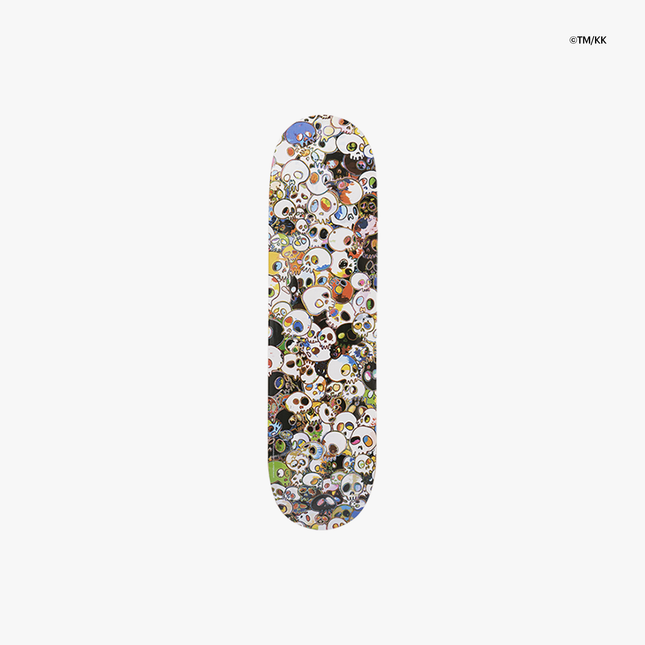
Takashi Murakami TM/KK Skull Skateboard Art Deck by Vans x Takashi Murakami TM/KK
Skull Skateboard Art Deck by Vans x Takashi Murakami TM/KK Limited Edition Archival Print on Wood Skateboard Deck by Street Artwork Graffiti Artist. 2015 Limited Edition Skateboard Art Deck Takashi Murakami, a highly esteemed Japanese contemporary artist, has played a significant role in propelling the popularization of pop, street, and graffiti art on a global scale. Known for his iconic style that melds Japanese traditional aesthetics with postmodern pop culture, he has brought to the forefront a fusion of high and low art forms, blurring boundaries and challenging traditional conceptions. One striking manifestation of Murakami's artistic prowess is his Skull Skateboard Deck Art. This piece is emblematic of his fascination with mortality, evoked through the stark, captivating skull imagery. Emblazoned across the surface of a skateboard deck, the design functions as a canvas that transcends the conventional gallery space, entering the realm of functional art. Murakami's Skull Skateboard Deck Art is more than a visual spectacle; it is an embodiment of the intersection of street and pop art. The medium of the skateboard deck acts as a symbol of street culture and youth rebellion, effectively associating itself with the ethos of graffiti art. The bold, playful representation of the skull, on the other hand, is rooted in pop art, using familiar, everyday imagery to evoke a profound, often overlooked theme of human mortality. Undeniably, Murakami's Skull Skateboard Deck Art stands as a testament to the dynamic evolution and expansion of contemporary art forms. By juxtaposing traditional symbols with contemporary mediums, it redefines the confines of art, allowing it to be accessible, functional, and yet still deeply philosophical. This piece is a shining example of Murakami's innovative style, a paradigm of pop, street, and graffiti art converging in an unexpected, compelling way.
$804.00
-
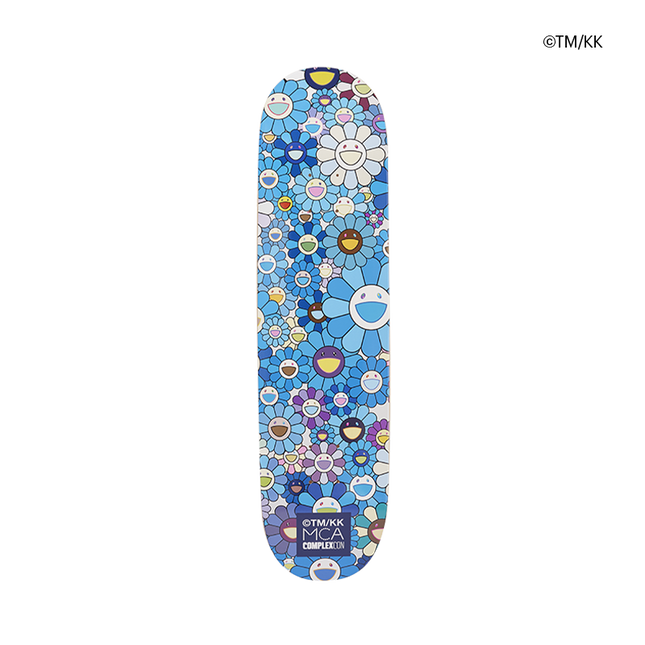
Takashi Murakami TM/KK Flower 8.0 Blue Skateboard Art Deck by Takashi Murakami TM/KK
Flower 8.0 Blue Skateboard Art Deck by Takashi Murakami TM/KK Limited Edition Archival Print on Wood Skateboard Deck by Street Artwork Graffiti Artist. 2017 Limited Edition Skateboard Artwork Size Approximately 8x31 Skateboard Art Deck Brand New Perfect Condition Skateboard decks are made from layers of wood veneer that are glued together to create a strong and flexible board. The Flower 8.0 Blue Skateboard Art Deck is made from high-quality Canadian maple wood, which is known for its durability and resilience. The deck measures 31 inches in length and 8 inches in width, making it suitable for a variety of skating styles. Takashi Murakami is known for his colorful and playful artworks that blend traditional Japanese techniques with contemporary pop culture. His iconic smiling flower motif has become a signature element of his work and has been featured in numerous exhibitions and collaborations with fashion and lifestyle brands. The Flower 8.0 Blue Skateboard Art Deck by Takashi Murakami TM/KK is a unique and collectible piece of art that combines skateboarding culture with contemporary art.
$659.00
-
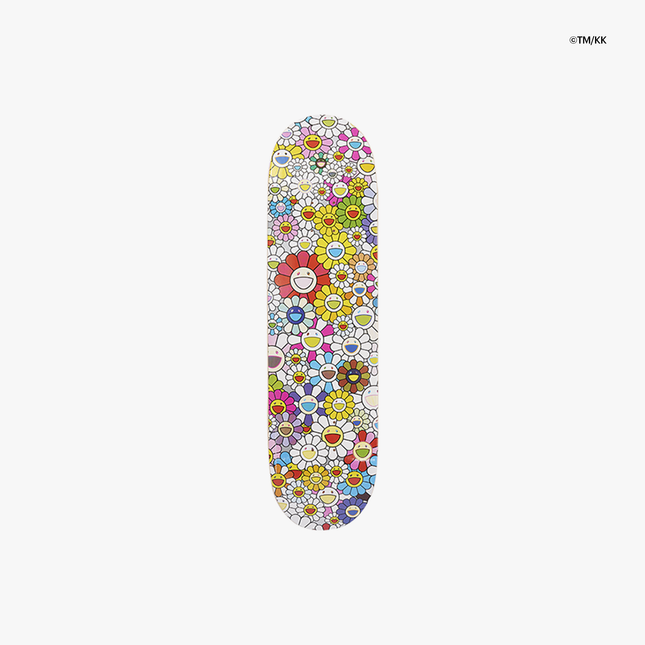
Takashi Murakami TM/KK Flowers Skateboard Art Deck by Vans x Takashi Murakami TM/KK
Flowers Skateboard Art Deck by Vans x Takashi Murakami TM/KK Limited Edition Archival Print on Wood Skateboard Deck by Street Artwork Graffiti Artist. 2015 Limited Edition Skateboard Art Deck Takashi Murakami, a prolific contemporary Japanese artist, has consistently blurred the lines between high art and commercial aesthetics, becoming a monumental figure in the world of pop art, street art, and graffiti art. His signature "Superflat" style, a term he coined himself, draws from the artistic traditions of manga and anime, echoing the flattened imagery of Japanese artistic history and commenting on post-war Japanese culture. In one of his celebrated series, Murakami presents the iconic "Flower Skateboard Deck Art." The series displays an amalgamation of two seemingly disparate worlds: the vibrant and expressive culture of skateboarding, and the elegantly simplistic form of traditional Japanese flower motifs. These skateboard decks are transformed into canvases, brimming with Murakami's signature smiling flowers, depicting a jubilant explosion of color and life. His aesthetic juxtapositions turn these functional objects into engaging and thought-provoking pieces of art. This series reflects the democratizing impulse of pop art and street art, bringing so-called "high art" into the public and popular realm, and offering a new perspective on everyday objects. With the Flower Skateboard Deck Art, Murakami pays homage to the street culture that has significantly influenced contemporary art and design, bridging the gap between street art, commercial design, and fine art. This intersection results in a vibrant display that encapsulates Murakami's distinctive vision while continuing to challenge and redefine artistic boundaries. The Flower Skateboard Deck Art, with its playful exploration of pop culture and traditional Japanese art, serves as an excellent representation of Murakami's complex artistic dialogue. In essence, Murakami uses the skateboard as a symbol, an embodiment of street culture, painting it with his iconic flowers to create a unique artifact that sits comfortably at the crossroads of pop art, graffiti art, and street art. These decks, emblazoned with his unmistakable style, embody Murakami's artistic philosophy, remaining testament to his ongoing contribution to contemporary art.
$804.00
-
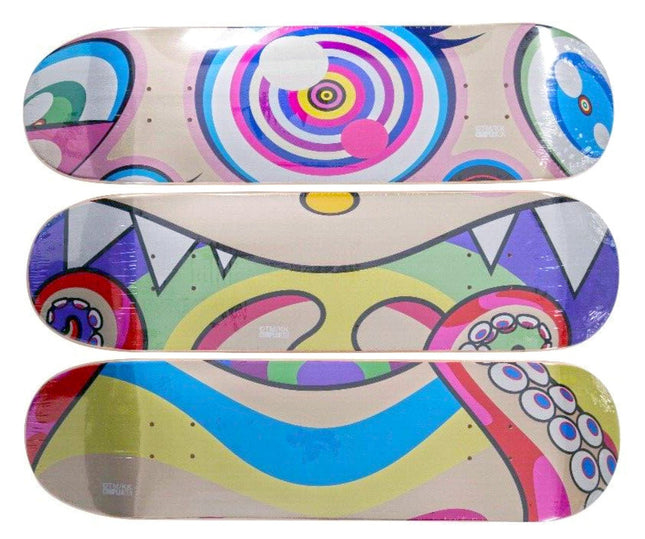
Takashi Murakami TM/KK ComplexCon x Dobtopus Skateboard Deck Set by Takashi Murakami TM/KK
ComplexCon x Dobtopus Octopus Deck Set Fine Art Limited Edition Archival Pigment Print Transfer on Natural Skateboard Deck by Street Artwork Graffiti Artist Takashi Murakami TM/KK. 2017 Set of 3. Released at ComplexCon in 2017, the Takashi Murakami Octopus Skate Deck Set features Murakami's well-known Octopus motif in a 3-deck set, which forms one cohesive image when displayed side by side. This deck set was released on November 4th, 2017. ComplexCon x Dobtopus Octopus Deck Set by Takashi Murakami: Character Power in Street Pop Art & Graffiti Artwork The ComplexCon x Dobtopus Octopus Deck Set by Takashi Murakami is a fine art limited edition release created in collaboration with ComplexCon in 2017. This set of three 8 x 31 inch natural wood skateboard decks features a single archival pigment print that spans across all three panels to create one unified composition. Released on November 4, 2017, the deck set captures Murakami’s colorful and character-driven visual language in a format that connects the worlds of commercial art, collectible design, and subversive culture. With bold colors, sharp linework, and surreal detailing, the Dobtopus motif illustrates Murakami’s ability to merge mythology, manga, and merchandise into a cohesive statement within Street Pop Art & Graffiti Artwork. This piece features a fragmentary and playful depiction of Murakami’s octopus variation of Mr. Dob, a recurring mascot-like character in his work. The octopus form adds a layer of whimsy and monstrous appeal, with swirling eyes, jagged teeth, and tentacles rendered in soft gradients and saturated linework. Circular motifs and exaggerated facial expressions are scattered across the image, contributing to the disorienting, multi-eyed aesthetic that is signature to Murakami’s practice. Each deck panel becomes a slice of chaos and delight, emphasizing the creature’s multiple personalities and uncontainable energy. The natural wood background allows the hyper-color design to float atop the surface, creating a unique tension between material tradition and visual excess. ComplexCon as a Platform for Art, Culture, and Urban Identity Released during ComplexCon, an annual cultural event that unites fashion, music, art, and design, this deck set exemplifies Murakami’s role as a conduit between fine art and popular street movements. Rather than isolating his work within the confines of the gallery, Murakami expands its presence through accessible formats and cross-industry collaborations. At ComplexCon, where hype culture and contemporary art collide, this deck served as a statement piece—grounded in the tradition of limited-edition streetwear drops but elevated by the conceptual depth and visual heritage of the artist. By producing this work as a triptych on skate decks, Murakami ensures that it functions both as wall art and cultural object. Skate decks remain a revered medium in Street Pop Art & Graffiti Artwork due to their duality: utilitarian tools reimagined as art surfaces. Here, they become the perfect canvas for Murakami’s explosive visual grammar, further cementing the decks' place in the aesthetic lexicon of modern counterculture. Character Culture and Emotional Spectacle in Murakami’s Visual Language Murakami’s use of the Dobtopus character speaks to his obsession with emotional exaggeration, facial mutation, and hybrid identities. The octopus-like figure, rendered with concentric eyes and wide, almost mechanical grins, disrupts traditional character expectations. It functions not just as a mascot but as a reflection of media saturation, information overload, and the fluidity of identity. By spreading the design across three decks, Murakami plays with fragmentation and unity—the viewer must step back to comprehend the full image, echoing how contemporary society often experiences clarity only through collective focus. These attributes are central to the sensibility of Street Pop Art & Graffiti Artwork. The visual overload, aggressive whimsy, and layered messaging parallel the techniques of urban artists who plaster cityscapes with characters and tags designed to provoke and remain. Murakami’s work, although more polished and refined, maintains that urgency and bite. His characters, especially Dob, have become contemporary totems—both playful and unsettling, cute and chaotic. Murakami’s Global Impact and Skate Art as Cultural Archive Takashi Murakami, born in Japan in 1962, continues to shape the international landscape of Street Pop Art & Graffiti Artwork by leveraging both traditional artistry and mass production. The ComplexCon x Dobtopus Octopus Deck Set is a crystallization of his career-long commitment to visual storytelling that operates on multiple levels. It is a collector’s piece, a pop spectacle, and a philosophical mirror all at once. With its 2017 release, it has become part of a larger archive of objects that document how artists challenge and transform the meaning of materials, characters, and cultural value. This deck set does not merely display an image—it encapsulates Murakami’s fusion of animation, anxiety, and spirituality into a surface that was once meant for rebellion and sport. The Dobtopus swims through flames of attention and noise, reasserting the power of the image in motionless form. Murakami reminds viewers that even the most commercial objects can become sacred, saturated with color, humor, and a carefully calculated chaos that never stops watching.
$1,500.00
-
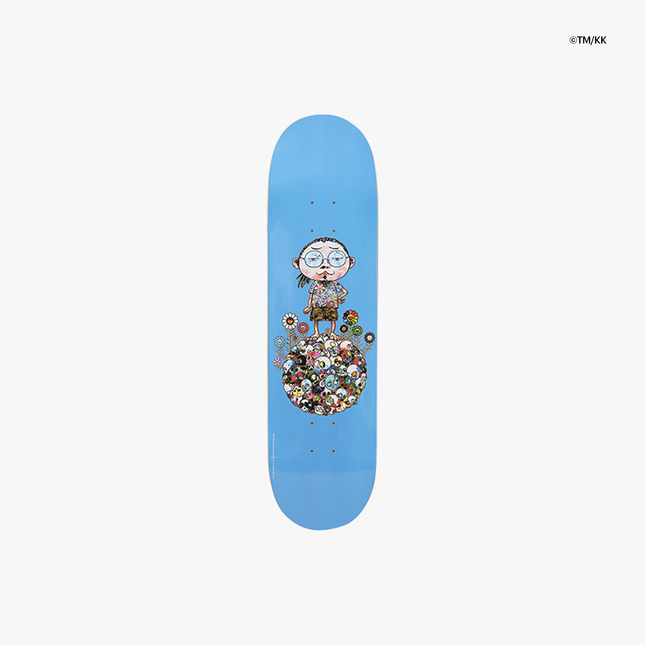
Takashi Murakami TM/KK Vault Portrait Blue Skateboard Art Deck by Vans x Takashi Murakami TM/KK
Vault Portrait Blue Skateboard Art Deck by Vans x Takashi Murakami TM/KK Limited Edition Archival Print on Wood Skateboard Deck by Street Artwork Graffiti Artist. 2015 Limited Edition Skateboard Art Deck The Vault Portrait Blue Skateboard Art Deck is an iconic embodiment of the intersection between the worlds of street art, pop culture, and high fashion. This masterfully crafted piece is the result of a collaborative effort between Vans, the renowned American manufacturer of skateboarding shoes and related apparel, and Takashi Murakami, a leading figure in the world of contemporary art known for blurring the boundaries between high and low culture. A testament to Murakami's distinct superflat style, the Vault Portrait Blue Skateboard Art Deck displays a colorful mix of vibrant blue hues combined with the artist's iconic smiling flowers, blending elements of Japanese traditional art with contemporary pop and graffiti aesthetics. The design is not merely aesthetically striking but also serves as a commentary on the omnipresence of consumer culture in our daily lives. Its name stems from the Vault by Vans line, a collection known for its unique collaborations and high-quality materials. Coupled with Murakami's artistry, the skateboard transcends its functional aspect to become a sought-after collector's item. This piece not only resonates with the global skateboard community but also with art enthusiasts and pop culture devotees, marking a significant cultural event that acknowledges the growing influence of street art in mainstream society. The release of the Vault Portrait Blue Skateboard Art Deck, therefore, has further underscored the impact of cross-disciplinary collaborations in the art world and the broader cultural sphere. This intersection of seemingly disparate fields reflects an evolving dynamic that celebrates creativity, unity, and the power of shared experiences. The resulting skateboard deck is a striking statement piece that celebrates both the history and future of street art, pop art, and the culture of skateboarding.
$804.00
-
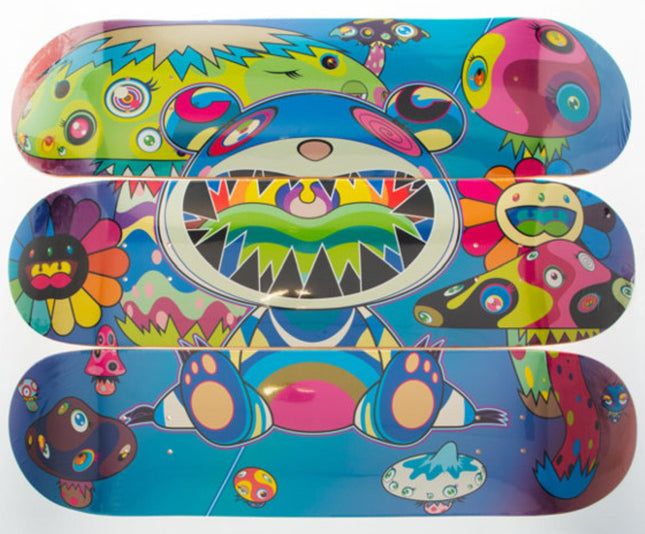
Takashi Murakami TM/KK ComplexCon x Mutated Skateboard Deck Set by Takashi Murakami TM/KK
ComplexCon x Mutated Deck Set Fine Art Limited Edition Archival Pigment Print Transfer on Natural Skateboard Deck by Street Artwork Graffiti Artist Takashi Murakami TM/KK. 2019 Printed Limited Edition Skateboard Art Deck Artwork Set of 3 ComplexCon x Mutated Deck Set by Takashi Murakami: Chromatic Mutation in Street Pop Art & Graffiti Artwork The ComplexCon x Mutated Deck Set by Takashi Murakami, released in 2019, is a limited edition fine art archival pigment print transferred onto a set of three 8 x 31 inch natural wood skateboard decks. Produced under Murakami’s TM/KK imprint and debuted during the cultural phenomenon of ComplexCon, this triptych exemplifies Murakami’s command over hyper-saturated pop imagery, symbology, and mutated character design. The composition features a chaotic, joyfully monstrous creature surrounded by eyes, psychedelic flora, and smiling flowers, delivering a visual explosion that merges Japanese pop surrealism with the raw attitude of Street Pop Art & Graffiti Artwork. The decks form a single connected image when displayed together, centered on a large mutated bear-like figure with jagged, color-bar teeth, spiraled eyes, and pawed limbs that stretch across the lower panel. Murakami’s signature smiling flowers and multicolor mushrooms, along with amorphous side characters, crowd the frame. Each character is rendered in thick outlines with neon gradients and surreal detailing, evoking a sensory overload reminiscent of animated psychedelia. The image is whimsical, aggressive, and haunting all at once. Murakami’s visual language here is not soft or cute—it is wild, carnivalesque, and purposefully destabilizing. The figures pulse with the emotional contradictions at the heart of Murakami’s mutated worlds. Takashi Murakami’s ComplexCon Contributions and Skateboard as Canvas ComplexCon has emerged as a global cultural platform that celebrates the fusion of art, fashion, design, and street identity. Murakami’s presence at the 2019 event was marked by the release of this deck set, offering attendees a limited-edition collectible that doubles as a museum-grade art object. Skate decks, often used by artists in the Street Pop Art & Graffiti Artwork movement, provide a dynamic and culturally loaded format. Their historical role as subcultural canvases aligns with Murakami’s mission to make art both democratic and immersive. By choosing this medium, Murakami continues his practice of challenging distinctions between consumer goods and fine art. The Mutated Deck Set, while printed and collectable, still retains its status as a street-ready object—a symbol of movement, youth rebellion, and visual storytelling. This format allows his work to live not just on gallery walls, but in the hands and homes of people who see culture as fluid and multi-layered. The high-definition printing on natural wood offers vibrant fidelity while keeping the authenticity of material intact. Symbolic Mutation and Emotional Saturation in Contemporary Visual Language Murakami’s use of mutated characters in this piece reflects his fascination with postmodern transformation and emotional overload. The main figure is an amalgamation of innocence and chaos, surrounded by fungal life forms and anthropomorphic flowers. These characters mirror feelings of overstimulation, digital addiction, and pop culture fragmentation. The chaotic layering of elements reflects the graffiti ethos—fill the surface, dominate space, leave a mark that resists being ignored. The work thrives in the tradition of Street Pop Art & Graffiti Artwork by weaponizing cuteness, twisting it into something primal. The flowers are not gentle—they watch. The colors do not soothe—they shout. This emotional tension becomes a form of cultural resistance, a declaration that art can be dazzling and unsettling at the same time. Murakami’s use of mutation as a recurring theme places his work in direct conversation with street art’s obsession with metamorphosis, identity play, and distortion. Murakami’s Cultural Synthesis and the Evolution of Street Pop Surrealism Takashi Murakami, born in Japan in 1962, continues to influence global visual culture through his multi-disciplinary projects that unify commercial production and philosophical depth. The ComplexCon x Mutated Deck Set is a vivid example of this ongoing work, presenting not only a composition filled with color and chaos but a conceptual artifact that speaks to art’s ability to mutate, like its subject matter. His work brings Japanese folklore, postwar trauma, contemporary media, and urban aesthetics into dialogue through characters that look playful but contain multitudes. This deck set serves as both archive and activation—transforming street materials into collectible visions, uniting fine art clarity with the street's emotional voltage. Murakami’s mutated forms are not deviations—they are evolutions. They represent where Street Pop Art & Graffiti Artwork is heading: into layered, playful, yet brutally honest expressions of culture’s surreal and saturated now.
$1,500.00
-
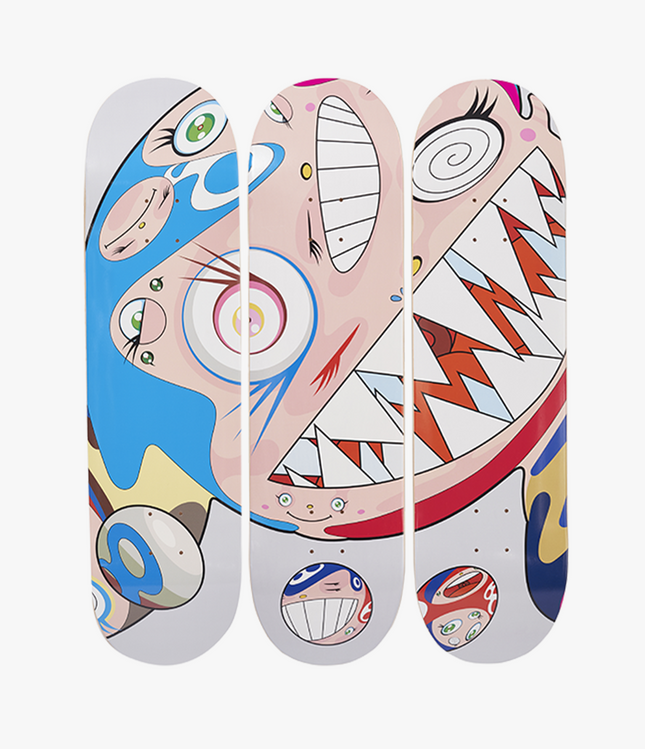
Takashi Murakami TM/KK Flying Dob Skateboard Art Deck Set by Takashi Murakami TM/KK
Flying Dob Skateboard Art Deck Set by Takashi Murakami TM/KK Limited Edition Archival Print on Wood Skateboard Deck by Street Artwork Graffiti Artist. 2018 Limited Edition Skateboard Artwork Size 8x31 Skateboard Art Deck Brand New Perfect Condition Flying Dob Skateboard Art Deck Set by Takashi Murakami: Japanese Iconography in Street Pop Art & Graffiti Artwork Flying Dob Skateboard Art Deck Set by Takashi Murakami is a limited edition fine art print on a triptych of 8 x 31 inch wood skateboard decks released in 2018 under the TM/KK studio imprint. Each deck presents a fragment of Murakami’s character Dob, whose energetic expression and surreal construction define a central part of his aesthetic vocabulary. This set, presented in brand new condition, merges Murakami’s globally recognized Superflat style with the raw and accessible surface of skate culture, making it a striking example of how contemporary Street Pop Art & Graffiti Artwork continues to evolve across unconventional platforms. Dob, often interpreted as Murakami’s mascot and alter ego, appears here with swirling eyes, massive teeth, and an explosive palette of electric blues, bubblegum pinks, whites, and reds. The visual design is disorienting and deliberately chaotic, characteristic of Murakami’s embrace of manga, anime, and Japanese commercial iconography. The composite image sprawls across all three decks, turning the set into both an art object and a collector’s item, fully blurring the lines between gallery art and functional street design. The decision to print this work on skate decks expands the accessibility and display potential of Murakami’s work while honoring the rebellious traditions of the surfaces it inhabits. Takashi Murakami and the Language of Commercial Surrealism Takashi Murakami, born in Japan in 1962, has spent decades exploring the visual intersections of fine art, commercial aesthetics, and youth culture. He developed the Superflat movement, which challenges the hierarchy of high versus low art and elevates cartoon, decorative, and commercial imagery into fine art contexts. Flying Dob exemplifies this practice, especially when seen on skate decks—objects traditionally aligned with underground subculture, athleticism, and anti-establishment messaging. Here, the decks function as mobile canvases that carry both the spirit of the street and the curated precision of contemporary design. Murakami’s use of the Dob character is complex. Part mascot, part warning, part self-portrait, Dob morphs across Murakami’s body of work as a representation of power, innocence, and uncontrollable emotion. In this composition, the fractured presentation across three decks intensifies the character’s chaotic energy. The large, angular teeth and swirling eyes become distorted by the deck separation, echoing how identity and perception are often fractured in consumer and digital culture. This psychological tension is core to both Murakami’s art and the visual language of Street Pop Art & Graffiti Artwork, which uses distortion, repetition, and vivid color to provoke response and invite inquiry. Street Surfaces and Contemporary Collector Culture Printing fine art on skateboards is not just a stylistic decision but a cultural one. Skate decks have long served as mobile billboards for self-expression, political graphics, and underground illustration. Murakami’s use of this surface format brings his work into dialogue with the visual codes of skater rebellion and DIY print culture. It also echoes the way graffiti and street art elevate everyday materials into lasting visual statements. The decks become a new kind of art print—limited, tactile, and tied to a specific youth-driven history. Flying Dob Skateboard Art Deck Set participates in the cultural practice of displaying what once existed solely in motion. It turns utility into symbol. This transformation reflects how Street Pop Art & Graffiti Artwork frequently subverts expectations—taking skateboards off the street and into the gallery while maintaining their attitude and visual punch. Murakami’s contribution amplifies this exchange by injecting his polished, commercial aesthetic into a medium traditionally associated with grit and destruction. Murakami’s Position in Street Pop Art & Graffiti Artwork Takashi Murakami stands as one of the few living artists whose practice fluidly spans fashion, merchandise, museum exhibition, and street influence without compromising complexity. The Flying Dob Skateboard Art Deck Set is a distilled example of his ability to fuse cultural layers into singular pieces that speak to mass media, personal mythology, and symbolic power. His work does not parody street culture; it contributes to it by redefining how characters, products, and art coexist in shared visual ecosystems. This set, with its razor-sharp execution and chaotic elegance, is both playful and unsettling. It demonstrates how Murakami continues to influence the direction of Street Pop Art & Graffiti Artwork while grounding it in Japanese visual tradition and hypermodern critique. Flying Dob is not simply a design—it is a statement rendered in wood, color, and fragmentation, made to be both ridden and revered.
$1,500.00
-
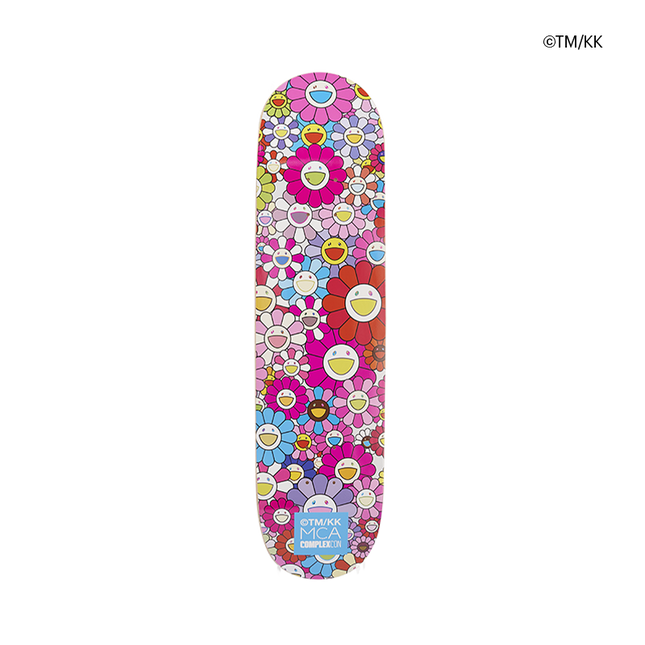
Takashi Murakami TM/KK Flower 8.0 Pink Skateboard Art Deck by Takashi Murakami TM/KK
Flower 8.0 Pink Skateboard Art Deck by Takashi Murakami TM/KK Limited Edition Archival Print on Wood Skateboard Deck by Street Artwork Graffiti Artist. 2017 Limited Edition Skateboard Artwork Size Approximately 8x31 Skateboard Art Deck Brand New Perfect Condition Skateboard decks are made from layers of wood veneer that are glued together to create a strong and flexible board. The Flower 8.0 Pink Skateboard Art Deck is made from high-quality Canadian maple wood, which is known for its durability and resilience. The deck measures 31 inches in length and 8 inches in width, making it suitable for a variety of skating styles. Takashi Murakami is known for his colorful and playful artworks that blend traditional Japanese techniques with contemporary pop culture. His iconic smiling flower motif has become a signature element of his work and has been featured in numerous exhibitions and collaborations with fashion and lifestyle brands. The Flower 8.0 Pink Skateboard Art Deck by Takashi Murakami TM/KK is a unique and collectible piece of art that combines skateboarding culture with contemporary art.
$659.00
-
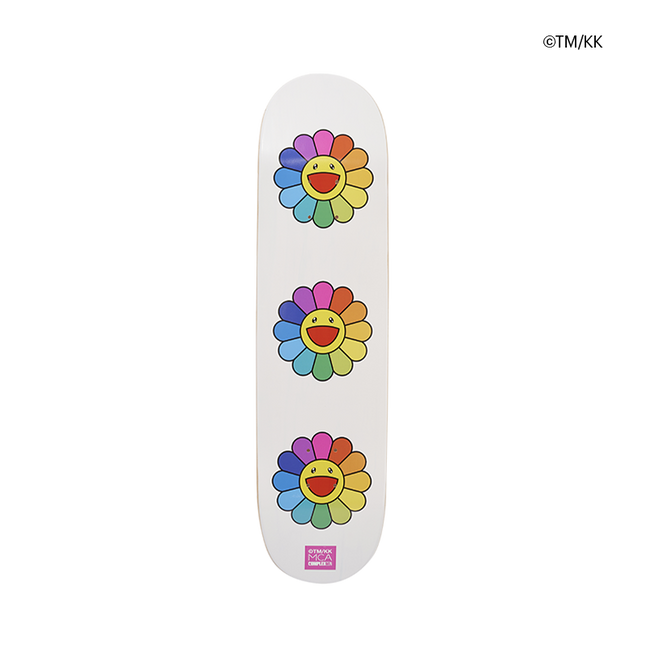
Takashi Murakami TM/KK Flower 8.0 White Skateboard Art Deck by Takashi Murakami TM/KK
Flower 8.0 White Skateboard Art Deck by Takashi Murakami TM/KK Limited Edition Archival Print on Wood Skateboard Deck by Street Artwork Graffiti Artist. 2017 Limited Edition Skateboard Artwork Size Approximately 8x31 Skateboard Art Deck Brand New Perfect Condition Skateboard decks are made from layers of wood veneer that are glued together to create a strong and flexible board. The Flower 8.0 White Skateboard Art Deck is made from high-quality Canadian maple wood, which is known for its durability and resilience. The deck measures 31 inches in length and 8 inches in width, making it suitable for a variety of skating styles. Takashi Murakami is known for his colorful and playful artworks that blend traditional Japanese techniques with contemporary pop culture. His iconic smiling flower motif has become a signature element of his work and has been featured in numerous exhibitions and collaborations with fashion and lifestyle brands. The Flower 8.0 White Skateboard Art Deck by Takashi Murakami TM/KK is a unique and collectible piece of art that combines skateboarding culture with contemporary art.
$659.00
-
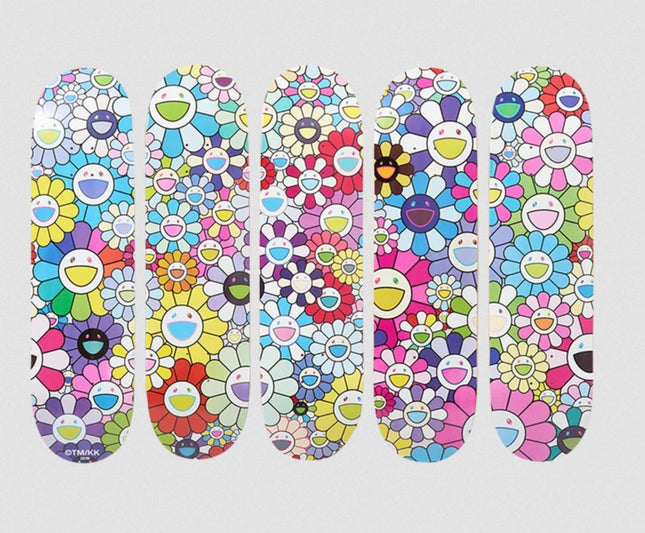
Takashi Murakami TM/KK TM/KK Flower Skateboard Deck Set by Takashi Murakami
TM/KK Flower Skateboard Set 2019 Limited Edition Offset Lithograph Skateboard deck art by street pop culture artist Takashi Murakami. 2019 5x Decks From Ultra Exclusive 20. Takashi Murakami (b. 1962) Flowers, pentaptych (set of 5), 2019 Offset lithographs in colors on skate decks 32 x 8 inches (81.3 x 20.3 cm) (each) Produced by Kaikai Kiki Co. Ltd., Tokyo
$2,916.00
-
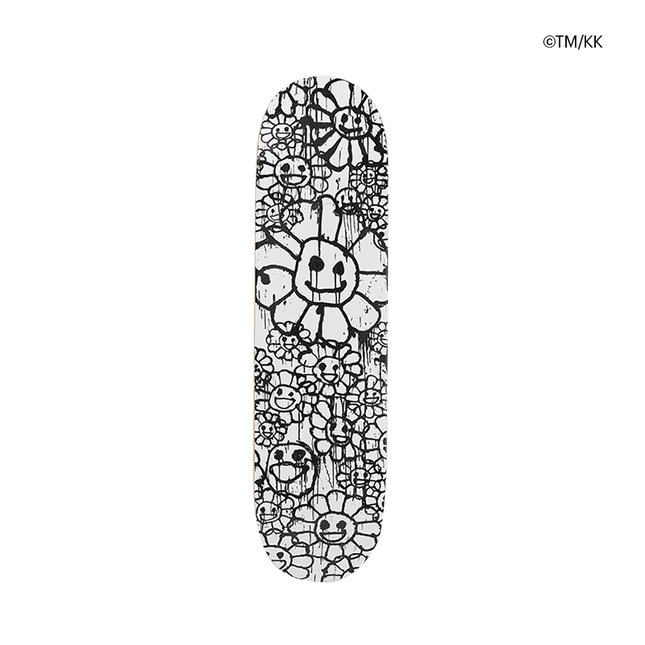
Takashi Murakami TM/KK Flower Skateboard Art Deck by Takashi Murakami TM/KK x Madsaki
Flower Skateboard Art Deck by Takashi Murakami TM/KK x Madsaki Limited Edition Archival Print on Wood Skateboard Deck by Street Artwork Graffiti Artist. 2018 Limited Edition Skateboard Artwork Size Approximately 8x31 Skateboard Art Deck Brand New Perfect Condition The Takashi Murakami TM/KK x Madsaki skateboard is a collaboration between two Japanese contemporary artists, Takashi Murakami, and Madsaki. The skateboard was released in 2019 as part of a series of limited edition skateboards produced by Murakami's company, Kaikai Kiki. The skateboard features a black & white design that combines elements from both artists' styles. Murakami is known for his use of black & white and cartoon-like flowers, while Madsaki often incorporates graffiti and street art into his work. The design on the skateboard features a mix of these styles, with bold, graphics and a graffiti-inspired background. The TM/KK x Madsaki skateboard is part of a larger trend of contemporary artists collaborating with skateboard companies to create limited-edition skateboards. These collaborations often attract both art collectors and skateboard enthusiasts, who appreciate the unique designs and the opportunity to own a piece of functional art.
$829.00

